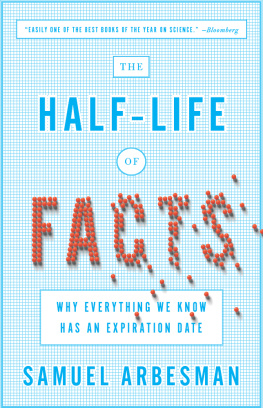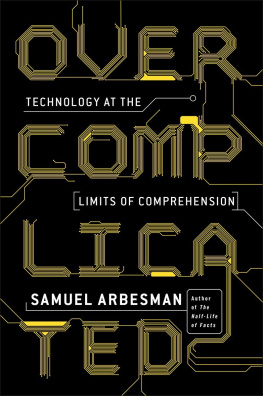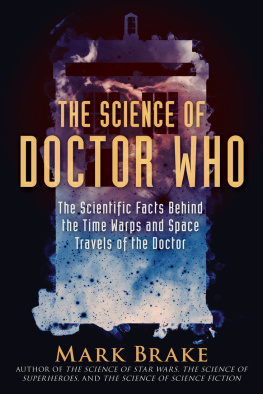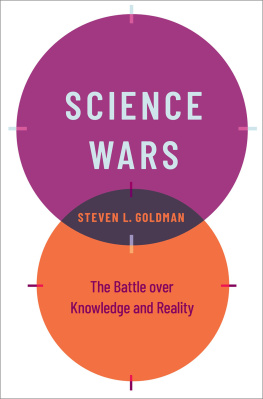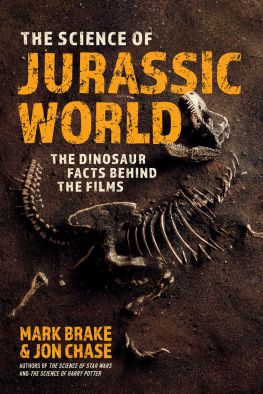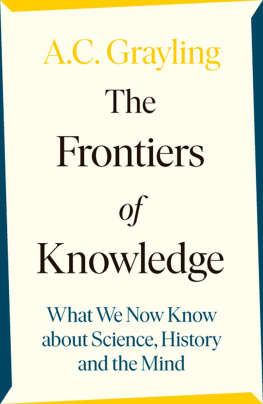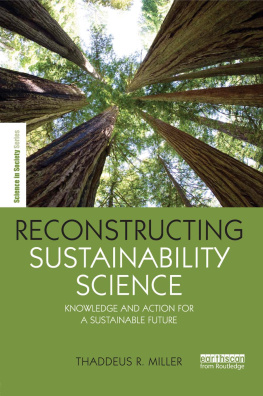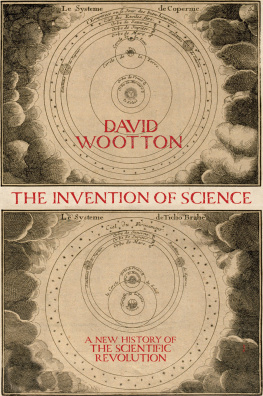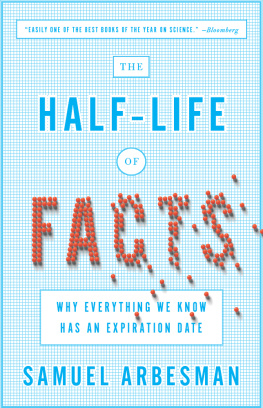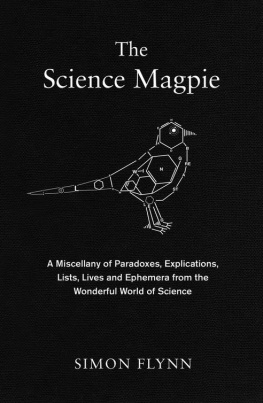ABOUT THE AUTHOR
Samuel Arbesman is an applied mathematician and network scientist. He is a Senior Scholar at the Ewing Marion Kauffman Foundation and a fellow at the Institute for Quantitative Social Science at Harvard University. In addition, he writes for popular audiences as a contributing writer at Wired, and his essays about math and science have appeared in places such as The New York Times, The Atlantic, and the Ideas section of The Boston Globe.
ACKNOWLEDGMENTS
An unbelievable number of people have been instrumental in making this book a reality. In the world of science I have had a great number of supporters and mentors. While it would be nearly impossible to list everyone, I would like to single out Steve Strogatz and Nicholas Christakis. Steve, my graduate school adviser, is a great mentor and friend, and a collaborator on numerous research projects. In addition, he encouraged me in writing and even provided me with my first opportunity to write for a large audience, at the New York Times. Nicholas Christakis, whose group I was a part of while a postdoctoral fellow, has also been a wonderful collaborator and friend, as well as acting as a mentor in both my research and writing. I have been privileged to work with such amazing scientists and writers, who nurtured the highly interdisciplinary and unorthodox path I have chosen for myself.
I have also had a number of supporters in the writing world. Gareth Cook, my former editor at the Ideas section of the Boston Globe, discovered my early writing and nurtured my skills. Both Gareth and Steve Heuser, the current editor of Ideas, also presided over the publication of my article about mesofacts that first got this whole book-writing process going. Thanks go to both the BostonGlobe and The Atlantic, where I was given the opportunity to write several articles that have been adapted here. In addition, Id like to acknowledge Wired Opinion, which published an article I wrote on the myth of iron in spinach that has been adapted here as part of the Afterword. And, of course, Id like to thank readers of the hardcover edition of this book for providing valuable feedback and updates. David Moldawer, who bought this book when it was a mildly coherent shell of what it hopefully has become, also deserves my thanks.
I have had the pleasure of having many supportive readers of early drafts, who also brought various concepts and articles to my attention. Thank you to Avi Gerstenblith, Paul Kedrosky, Jukka-Pekka Onnela, Jason Priem, Niels Rosenquist, and Josh Sunshine.
K. Brad Wray deserves thanks for introducing me to so many ideas in the philosophy of science, including the fallacy of Plancks Principle, in addition to taking the time to read an entire draft of this book and providing incredible feedback. Ari Cohen Goldberg deserves my thanks for providing a great deal of expertise in the realm of language. Thanks to Brian Switek for talking with me about how our knowledge about dinosaurs has changed in the past several decades, making sure I didnt get too much wrong about dinosaurs, and spending longer than anyone else I have spoken with reminiscing about the brontosaurus. In addition, both Brian and Ari were instrumental in shaping my thinking about the generational component of knowledge change, each independently bringing it to my attention. Sarah Gilbert and Rena Lauer were also instrumental in helping with my questions about medieval Europe.
Countless people have also pointed me to articles and ideas, and supported me in numerous other ways during this process. Thank you to everyone.
Of course, if youve gotten this far, you know that facts become out-of-date and errors propagate. Therefore, its only natural for me to inform the reader that any errors are, of course, my own. You have been so warned.
I owe a great deal of appreciation to Max Brockman, my agent, for having brought me into the world of book writing and providing advice throughout. Courtney Young, my editor, shepherded this book at every stage and has earned my perpetual gratitude. And Niki Papadopoulos, you joined the editing process at the very end but have been a great help in making sure that the book ended up being the best version possible, and actually got it out the door.
My parents have been supportive of this project all along, having read multiple drafts, for which I am incredibly appreciative. But more important, they instilled in me a love of learning. I have strived to live by their daily exhortation to me before heading off to elementary school: Think, have fun, and be a mensch.
My grandfather, Irwin Arbesman, in addition to allowing me to kick off the book with a great story, is an amazing sounding board for all of my ideas, and has provided wonderful feedback during this entire process. I owe him a great deal of thanks.
And, last, Id like to thank my wife, Debra. She has been incredibly supportive and proud of me at every stage. She read so many drafts, giving comments on each, and has been willing to listen to me speak about the topics in this book over and over, ad nauseam (at least for her). Debra, you are truly an eishet chayil.
AFTERWORD TO THE PAPERBACK EDITION
In June 2012, a screenshot from Back to the Future went viral. The film snippet showed that on June 27, 2012, the DeLorean hurtled forward in time. After a certain amount of excitement, posts, and retweets, people soon realized that the image had been modified: the actual date wasnt for three more years, with the DeLorean slated to arrive in the future on October 21, 2015. And it turns out this wasnt even the first time this had happened: A similarly fudged screenshot of the DeLoreans time counters had spread across the Internet just two years prior (and was nothing more than a jokingly altered screenshot that spread to far more people than were aware of the joke).
Not only were people spreading incorrect information, but the collective Internet consciousness didnt even recognize that it had been tricked by this same manipulation before. But even when we do recognize such errors, we cant fix them as easily as we might like.
Knowledge changes around us all the time, but that doesnt mean we always have the most up-to-date facts. Even though we live in an age of instant and massive information dissemination and despite our unprecedented ability to rapidly learn new things and crowdfix mistakes, Knowledgeand its sinister twin, Errorcontinues to propagate in complex and intriguing ways. Errors persist for far longer than they should, even when there is more accurate knowledge elsewhere. For example, medical misinformation thrives and spreads on the Internet alongside Web sites that both provide correct practices and even actively work to debunk the bad science. Newer knowledge does not spread as fast as it should, and it weaves its way unevenly throughout society.
The problem isnt just epistemologicalit can have serious consequences. Doctors might not realize there is a newer and better treatment for a disease. Teachers might not have the most current materials on what dinosaurs looked like. Entire fields of science invest time and money recapitulating the findings of others due to their ignorance of other fields advances.
While ongoing scientific inquiry is one solution to improving knowledge and rooting out error, the diffusion of accurate facts is far from instant or guaranteed. For example, many retracted scientific papers are still cited years after they have been retracted. The number of citations may drop quite rapidly once a finding is retracted, but it can still be cited long after the study has been discredited or otherwise rendered obsolete. Id like to think were getting better. Its easier than ever before to look things up online or to correspond with experts. But as knowledge continues to expand, it becomes harder to be keep track of all the changes.

